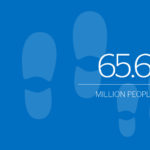Today’s number is about… refugees
65.6 million people in the world had been forcefully displaced from their homes in 2016 due to war, violence or persecution. This represents a 300,000 increase from the previous year, according to data from the United Nations High Commissioner for Refugees (UNHCR).

In the report UNHCR Global Trends: Forced Displacement in 2016, which is presented every year on World Refugee Day (June 20th), the agency explains that this figure means that one in every 113 people in the world is currently displaced.
In each of the past five years, annual increases in total displacement have been in the millions. Although the 2016 total is high, representing an enormous number of people in need of protection around the world, it also shows that displacement growth has slowed.
The total figure includes 40.3 million people who are internally displaced within their own countries - around 500,000 fewer than in 2015. Also, the total number of people requesting asylum was 2.8 million, about 400,000 fewer than the previous year.
However, the total number of people seeking security through international borders as refugees reached 22.5 million - the highest number since UNHCR was founded in 1950 in the post World War II period.
In this regard, Syria continues to be the country with the most refugees and internally displaced people in the world, with a total of 12 million - nearly two thirds of the country’s population. Not counting the protracted situation of the Palestinian refugees who have been displaced for decades, the countries with the largest number of people forced to abandon their homes are Colombia (7.7 million), Afghanistan (4.7 million), Iraq (4.2 million) and South Sudan, the country with the fastest growth of displaced people: 3.3 million had fled from their homes at the end of 2016.
On the other hand, around 500,000 refugees and 6.5 million internally displaced people were able to return to their places of origin. The report notes that 189,300 refugees were part of resettlement programs in 37 countries.